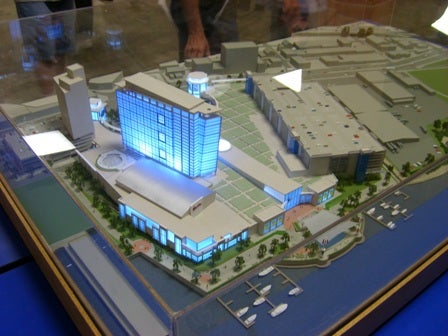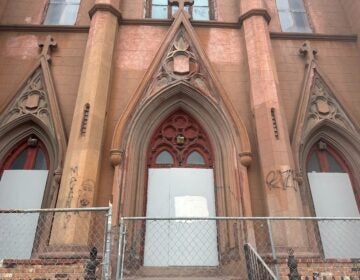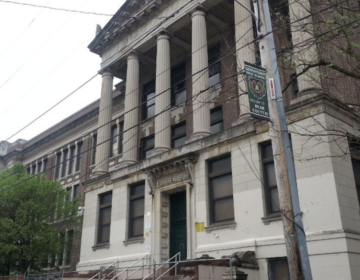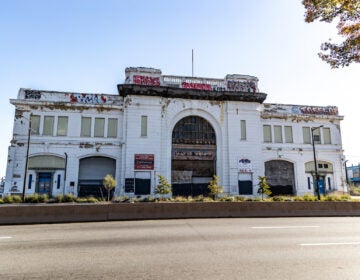SugarHouse woos Fishtown fans

By Matt Blanchard
For PlanPhilly
Maggie O’Brien needed a crowd on Tuesday night. She needed a big one.
As the founder of a pro-casino neighborhood group called Fishtown Action (FACT), O’Brien has been accused of playing the role of shill for SugarHouse casino, of seeking casino jobs for herself and for her children, and of selling out to a gambling concern that seeks to strip-mine her community with nickel and dollar slots.
But O’Brien got the big crowd she needed on Tuesday night, and with it a measure of vindication. Nearly 300 people poured into a Fishtown church hall for FACT’s first public meeting. Despite months of heavy organizing by anti-casino groups, most of those in attendance clapped wildly for a project they believe will bring quality jobs back to their rat-infested waterfront.
“We can no longer stand by and let other people speak for us,” O’Brien told the crowd. “We now have 200 members, making us the largest membership group in Fishtown … And I can tell you, we will not be silenced, we will be heard.”
The pro-casino meeting could turn out to be a substantial victory in the war over casinos in Philadelphia. On Wednesday, June 13th, City Council will consider measures that could either ban casinos from within 1,500 feet of any neighborhood – or give Sugarhouse the green light to begin construction. Two city councilmen in attendance said they were impressed by the grassroots support for SugarHouse, and strongly implied their own positions on the matter were flexible.
Councilman Frank DiCicco started by telling the crowd his reputation as an anti-casino crusader was inaccurate: “I have never been against casinos, contrary to what you may read, or what people tell you,” DiCicco said. “I have always been about a process.”
The process in question was the selection of casino sites by the Pennsylvania Gaming Commission with little community input. Before the meeting, DiCicco said that, for now, he’s still pushing to move casinos at least 1,500 feet from neighborhoods, “until such time as the communities come together and tell me something otherwise.”
After DiCicco left, Councilman Darrell Clarke told the crowd that DiCicco had personally told him he was looking for a signal from the residents of Fishtown to tell him which way to go. “I think you’ve sent that signal tonight,” Clarke said.
For his part, Clarke said SugarHouse was a far better project than Foxwoods, its South Philadelphia counterpart, and deserved more favorable treatment. “Now that the election is over, I think it’s time to start separating these issues, and let’s deal solely with SugarHouse,” he told the crowd to applause. Yet afterwards, Clarke said he had not decided how he would vote.
A Front for SugarHouse?
The war over casinos is also a battle for grassroots influence.
Up to now, the strongest claim of grassroots support has been made by anti-casino forces. The anti-gambling group Casino Free Philadelphia collected 30,000 signatures to put an anti-casino referendum on the May 15th ballot. When that effort was thwarted by state courts, the group then gathered another 13,000 votes in a mock-election held at polling places citywide – an undoubted grassroots coup.
The appearance of FACT, the only known pro-casino community group, provoked accusations that the group was merely a front for SugarHouse.
Indeed, Tuesday night’s meeting was to be protested by yet another group, Fishtown Against Sugarhouse Takeover (FAST), whose founders call for an investigation into ties between FACT and the casino. In a press release, member Chuck Valentine said SugarHouse has been drumming up support with three direct mail pieces, two robo-calls and finally, a call from a SugarHouse executive Joann Weber urging him to attend Tuesday night’s FACT meeting.
“FACT is nothing more than a casino front. The group has been bought and paid for by out of town billionaires and local insiders with ties to powerful politicians in this city,” Valentine said.
FACT founder O’Brien laughs off the accusation: “Bought and paid for? What did they buy us with?”
“How are we going to get anything addressed if we’re not talking to them?” O’Brien said. “We want to know if they’re going to hire people from the neighborhood. Is there going to be a community benefits agreement? How are they going to handle traffic? If we’re not talking to them, how are those questions answered?”
So, starting in March, FACT hosted six coffee-klatches in O’Brien’s living room, where top SugarHouse executives rubbed elbows with residents. The movement grew large enough finally to fill the basement hall of Holy Name Church at Berks and Gaul streets. Due to a heated war of words with anti-casino activists, FACT mustered a squad of burly men to check IDs at the door and admit only Fishtown residents.
Sugarhouse Largesse
“They’ve given us $10,000 – free money, no questions asked – to help keep tuition reasonable,” Groarke said. “I think their commitment to the community is going to be a strong one.”
Other recipients of Sugarhouse largesse mentioned at the meeting include a church whose roof was damaged by lightning, two soccer programs, and the Fishtown Athletic League. SugarHouse President Bob Sheldon was reluctant to provide a total dollar figure for donations.
“It’s not something we really want to broadcast, so I don’t really want to comment on that,” Sheldon said. “We’re supporting a number of organizations in the community, but we look to community members like these people here to tell us who is the most deserving of it. I don’t think it makes any sense is to publish a list.”
“I think they’re honest”
To residents, these small donations build trust in the casino. They also lend credence to SugarHouse promises of much larger benefits to come, both in jobs and amenities.
SugarHouse has said it is willing to provide $1 million a year to fund a special services district in order to increase security and cleanliness in the blocks around the casino – and to use however the community sees fit. It could mean a level of manicuring not seen north of Society Hill.
To speak about jobs, SugarHouse HR vice president Joann Weber was on hand, listing dozens of positions to an eager crowd. “There’s going to be a lot of entry level jobs, there will be supervisor jobs, manager jobs, we need director jobs, and we need vice president jobs. We’re going to need receivers, we’re going to need accounting clerks,” she said.
Though Fishtown is now in vogue with hipsters and professionals, long time Fishtown natives see their neighborhood as having narrowly escaped the fate of other city neighborhoods, hollowed-out by the loss of industry and weakened by drugs and crime.
To some, the one-armed bandits of SugarHouse will worsen that picture, sucking out the income of local retirees and attracting street crime. But to many at Tuesday’s FACT meeting, they’re an antidote to disinvestment, a source of desperately-needed jobs, no college degree required, a rebirth of industry on the waterfront.
“Other neighborhoods have suffered tremendously; we’ve been lucky,” said nurse Betty Ann Whitesell as she walked down Berks Street. “The casino will help our survival. They’re going to provide the neighborhood jobs.”
“I realize, to be honest, that the casinos can tell you what you want to hear, anybody can,” Whitsell said. “But what they were willing to sign on the dotted line for in terms of commitment to the community, is what convinced me. They’re willing to give Fishtown a million dollars.”
“I think they’re honest,” she said.
Against that sentiment came people like younger Fishtowner Leah Shirey, who watched Tuesday night’s proceedings from the back of the room with a gimlet eye.
“I’m anti-casino and I think this is a bunch of bull—-,” Shirey said. “This feels like a bunch of cheerleading and empty promises. If you look at other cities where casinos have moved in, they never hold up their promises.”
A member of both the FNA and FAST, Shirey had minutes earlier been on a corner outside handing out anti-casino literature as part of a modest protest effort.
“We didn’t want it to look like everybody in the neighborhood was for SugarHouse,” Shirey said. “The anti-casino groups have the real grassroots support.”
Resolutions
By meeting’s end, the membership of FACT passed two resolutions by voice vote. The first called on City Council to approve a rezoning of the SugarHouse site to a designation called “Commercial Entertainment District,” a measure introduced by Councilman Juan Ramos which will be discussed on the 13th. The second resolution called on state rep. Mike O’Brien to introduce riparian rights legislation for Sugarhouse Casino within 30 days.
WHYY is your source for fact-based, in-depth journalism and information. As a nonprofit organization, we rely on financial support from readers like you. Please give today.






